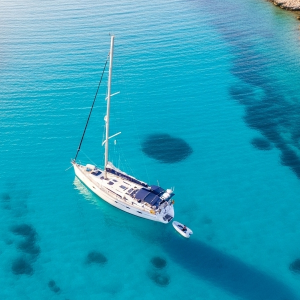- Posts: 104
- Thank you received: 0
Cruising in a Disaster: Signs to Look Out For When Sailing in an Emergency Situation
- The_Captain
-
 Topic Author
Topic Author
- Offline
- Administrator
-

Living on a sailboat as part of your preparedness strategy offers unique advantages, especially when it comes to navigating through or escaping from emergency situations and societal collapse. However, just like any other form of travel, there are risks involved-some more subtle than others. Understanding the signs that indicate a situation is deteriorating can make all the difference in ensuring your safety and comfort during an emergency.
Recognizing Early Warning Signs
Economic Instability: One of the first signs you may notice before social collapse occurs is economic instability. Currency values fluctuate wildly, inflation spirals out of control, and goods and services become increasingly expensive without a corresponding increase in quality. In extreme cases, essential items like food and fuel might not be available at all due to shortages or government rationing. If you're observing these patterns while on your sailboat, it’s wise to start thinking about relocating to safer waters sooner rather than later.
Political Turmoil: Political instability often precedes broader societal collapse. You may observe increased military presence around key infrastructure such as ports and airports; this could signal heightened tensions or impending conflict. The media might report more frequently on political unrest, civil protests, strikes, or even violent actions by factions within the population. Additionally, government officials may issue increasingly urgent calls for calm or emergency measures which indicate growing dissatisfaction among citizens.
Social Unrest: Social unrest manifests differently across cultures but generally involves an increase in crime rates and lawlessness. Criminals exploit situations of chaos to seize control over valuable resources like food supplies or transportation networks. This can lead to looting, vandalism, and other forms of property destruction. An atmosphere of fear might set in as people become wary of strangers and less willing to cooperate with authorities.
Physical Signs of Deterioration
Infrastructure Failure: Infrastructure failures are another critical indicator that something is going wrong within society. Power outages could last for days or even weeks without any sign of restoration, leading to widespread discomfort and disruption. Water supply systems may fail entirely if not properly maintained during periods of unrest or war, resulting in severe shortages and health hazards.
Communication Disruptions: Communication disruptions can also serve as early warnings about looming disasters. Cellular networks might degrade rapidly due to lack of maintenance or intentional interference by hostile forces attempting to spread misinformation. Satellite phones could become unreliable too since they rely heavily on satellite coverage that may be interrupted during conflicts involving space assets.
Strategic Navigation Tips
Avoid Conflict Zones: It's important for preppers and survivalists alike to avoid areas where conflict is likely, whether natural disasters or human-made ones. Familiarize yourself with maps of potential conflict zones so you know which routes to steer clear from when navigating through disaster-stricken regions. For example, if there’s a known oil spill in the area, consider going around rather than sailing through it.
Stay Informed: Keeping up-to-date with local news sources will help you stay informed about emerging crises and avoid areas where things are getting worse faster than elsewhere. Reliable maritime channels can provide real-time updates on weather patterns and other navigational hazards. By staying proactive and aware, you'll be better equipped to make sound decisions regarding your course of action during challenging times.
Develop Alternative Plans: Finally, having multiple backup plans is crucial for any emergency scenario. Depending on the nature of the disaster, different strategies might prove more effective than others. For instance, if a hurricane threatens your current location, knowing alternative anchorages nearby could save lives. Similarly, maintaining relationships with local marinas and captains who operate in various parts of the world allows you to adjust course swiftly when conditions change unexpectedly.
Conclusion
Sailing through or away from disaster zones requires vigilance and preparation. By recognizing early warning signs like economic instability, political turmoil, social unrest, infrastructure failure, communication disruptions, and staying informed about potential conflict areas, preppers can enhance their chances of successfully navigating through emergencies safely. Developing alternative plans and maintaining a network of supportive contacts further strengthens your resilience in such situations.
By being attuned to these indicators and taking appropriate precautions, you're setting yourself up for success whether dealing with natural disasters or broader societal collapse. Remember that careful observation and strategic navigation are key components of effective disaster preparedness when sailing on a sailboat.
The Captain has spoken!
Please Log in or Create an account to join the conversation.
One thing I reckon could be added to this here article is the importance of having a good understanding of the boat you're sailin' on. In an emergency situation, knowing the ins and outs of your vessel becomes crucial. For instance, I've installed solar panels on my boat. This ensures I have a constant power supply if I'm out at sea for a long stretch, especially during a disaster when every resource counts.
Also, one thing I've learned from my prepping journey is the importance of having a solid SHTF plan. You've touched on having alternative plans, which is spot on. I'd just add that regularly practicing and revising these plans with your crew or family is also key. You don’t want to be figuring out who does what when the pressure is on.
All in all, this is a fine guide for any sailor-prepper. Keep the good stuff coming!
Please Log in or Create an account to join the conversation.
- WildernessExplorer
-

- Offline
- Junior Member
-

- Posts: 20
- Thank you received: 0
One crucial aspect I'd like to accentuate from my own experience is the importance of being self-reliant and adaptable aboard your vessel. This isn't limited merely to having a stockpile of provisions and medical supplies or knowing how to repair your sailboat. It extends to the mental preparedness to endure extended periods of solitude, as well as the physical readiness to handle the rigors of sailing and surviving at sea.
Furthermore, I'd suggest fellow mariners to have a deep understanding of meteorology. The importance of being able to read weather patterns, predict incoming storms, or even understanding the best times to sail cannot be overstated. This knowledge could mean the difference between smooth sailing and getting caught in a deadly storm.
Another point to consider is the potential for piracy, especially in a lawless, post-collapse scenario. Having a plan for such encounters, whether it involves evasion, confrontation, or negotiation, could be a lifesaver. While we all hope that it never comes to this, it's better to be prepared and not need it than to need it and not be prepared.
Lastly, always remember to respect the sea. She's a harsh mistress, but also a provider and a sanctuary. So, fellow sailors, stay vigilant, stay prepared, and may fair winds always fill your sails.
Please Log in or Create an account to join the conversation.
- FairwindPrepper
-

- Offline
- Junior Member
-

- Posts: 20
- Thank you received: 0
To add to your point about communication disruptions, I've found it indispensable to keep a good ol' fashioned paper map and compass onboard. Not just for navigational purposes, but also for plotting out areas of potential conflict, as you mentioned. In the event that all digital communication is lost, these can be a real lifesaver.
Also, it'd be worth considering the importance of self-sustainability while at sea during emergencies. My sailboat is equipped with solar panels and a water maker, which enables us to be energy efficient and have a steady supply of fresh water. That's another layer of preparedness that could increase your chances of survival when the chips are down.
I'd suggest a follow-up piece diving into the importance of sustainability on a boat during emergencies, delving into details about energy generation, water treatment, and food storage onboard. It's one thing to escape to the sea during a disaster, but quite another to sustain that lifestyle for an extended period.
Lastly, from my experience, the sea can be a harsh mistress, but also a source of solace. In the face of disaster and societal collapse, the tranquility of the open ocean can offer a serene contrast to the chaos. It's not just about preparing for disaster, but also finding peace amidst it all. Keep the wind in your sails and stay prepared, folks!
Please Log in or Create an account to join the conversation.
Just finished reading this fantastic piece on disaster preparedness while sailing and I must say, it's a breath of fresh sea air.
I've been a prepper for a decade now, and my vessel, a 1987 Beneteau First 35, is my primary bug-out vehicle. I reckon your section on recognizing early warning signs hit the nail on the head. Economic instability and political turmoil are indeed early indicators of a storm brewing, and a sailor would do well to pick up on these signs and adjust their course accordingly.
However, I'd also like to add that preparing for disasters is not just about recognizing these signs, but also about having a boat that's well-equipped to handle emergencies. For instance, my sailboat is fitted with a water desalination system, which can produce 25 liters of fresh water per hour. This can be a game-changer when you're out on open water for an extended period of time.
Moreover, I'd like to stress the importance of having redundant power generation systems. My boat carries a set of solar panels and a wind generator. This combination ensures that I'm not left in the lurch if one system fails or underperforms.
Your strategic navigation tips are spot on. Avoiding conflict zones and staying informed are key to navigating through disaster-stricken regions. But remember, mates, that preparation is not just about escaping danger but also about self-sufficiency and resilience.
I'd suggest that budding preppers also consider learning how to fish and dive for seafood. These skills can provide a sustainable food source and even prove therapeutic. I have found that being able to feed oneself while at sea adds an extra layer of security and independence.
Thanks for the insightful article. Let's keep the conversation going and continue to share our knowledge and experiences. After all, we're all in the same boat, aren't we? Stay safe and sail on!
Fair winds and following seas,
Blackjack
Please Log in or Create an account to join the conversation.
One crucial point I would add, based on my experience, is the role of self-sufficiency in ensuring survival. On my 40-foot sloop, I've equipped it with solar panels and a desalination system. I've found that having a reliable source of power and clean water offers a significant advantage in a disaster scenario. It allows me to stay at sea for extended periods without needing to risk exposure to potentially dangerous situations on land.
Additionally, while avoiding conflict zones is fundamental, I find it equally important to understand and respect the ocean's potential fury. Sailing in adverse weather conditions can be just as dangerous, if not more so, than navigating through areas of human conflict. Always staying up-to-date with weather forecasts and understanding how to read the signs Mother Nature provides can be a lifesaver.
Lastly, I'd encourage fellow sailors and preppers to remember that our vessels are more than just bug-out options; they are our homes on the water. Treat them with the same care and respect you would your land-based residence. Regular maintenance checks, equipment upgrades, and knowing every inch of your boat inside and out are all key aspects of sailing preparedness.
Let's remember, our love for the sea isn't just about escaping disaster, it's about embracing a lifestyle of freedom and self-reliance. Stay safe out there, mates!
Please Log in or Create an account to join the conversation.


